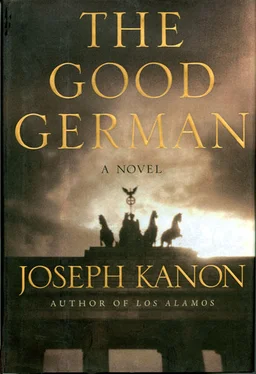“Is it ordinary to get shot?”
“More than you’d think,” he said wearily. “The war’s not over here. Look at them,” he said, indicating the Russians. “Toasts. Their men are still all over, drunk half the time. Last week a jeepload of them start waving guns down in Hermannplatz-our zone-and before you could say boo, one of our MPs starts shooting and we’re back at the O.K. Corral. Three dead, one ours. So we protest to the Russians and they protest back and there are still three people dead. Ordinary.”
He turned to face Jake, his eyes gentle. “Look, we’re not angels here. You know what an occupation army does? It occupies. They pull guard duty. They stand in front of buildings. They’ve got nothing but time. So they bitch and chase girls and make a little money selling their PX rations, which they’re not supposed to do but they figure they’re entitled, they won the war, and maybe they’re right. And sometimes they get into trouble. Sometimes they even get shot. It happens.” He paused. “But it doesn’t have to be an international incident. And it doesn’t have to make the army look bad. It’s what happens here.”
“But they’ll file a report. It’s still not that ordinary, is it?”
“And you want to see it.”
“I’m curious, that’s all. I never found a body before.”
Muller looked at him, appraising. “It might take a while. We don’t know who he is yet.”
“I know who he is.”
Muller raised his eyes. “I thought there weren’t any tags.”
“I knew his face. We were on the plane together. Lieutenant Tully.”
Muller said nothing, just stared, then slowly nodded his head. “Come to my office tomorrow. I’ll see what I can do. Elssholzstrasse.”
“Which is where?”
“Schoneberg. Behind Kleist Park. The drivers will know.”
“The old Supreme Court?”
“That’s right,” Muller said, surprised. “It was the best we could find. Not too much damage. Maybe God has a soft spot for judges. Even Nazi judges.”
Take grinned. “By the way, did anyone ever tell you—”
“I know, Judge Hardy. I suppose it could be worse. I don’t know, I haven’t seen the movies.” He glanced at Jake. “Tomorrow, then. That’s two favors you owe me. Now come and meet some Russians. Sounds like things are revving up.” He motioned toward the front room, where the piano had switched from Cole Porter to a thumping Russian song. “They’re the real story in Berlin, you know. They’ve been running things for two months-it’s their town. And look at it. Remind me to show you another report tomorrow. Infant mortality. Six out of ten babies are going to die here this month. Maybe more. Die. Of course, that’s politics. Scandal sells papers.”
“I’m not looking for any scandal,” Jake said quietly.
“No? You might find some, though,” Muller said, his voice weary again. “I don’t suppose your lieutenant was up to much good. But if you ask me, that’s not the real scandal. Six out often. Not just one soldier. Life’s eheap in Berlin. Try that story. I have all the facts you need for that one.” He stopped, catching himself, and finished off his drink. “Well. Let’s go promote some Allied cooperation.”
“They seem to be doing all right,” Jake said, trying to be light. “It’s turning into a Russian party.”
“It always does,” Muller said. “We just bring the food.”
But language had divided the party into its own occupation zones. The Russians Jake met nodded formally, tried a few words in German, and retreated back into their steady drinking. The piano had returned to the American zone with “The Lady Is a Tramp,” but the Russian player hovered behind, ready to reclaim the keyboard for his side. Even the laughter, getting louder, came from isolated pockets, separated by untranslatable jokes. Only Liz, gliding in with a quick wink to Jake, seemed to bring the party together, suddenly drawing both sets of eager uniforms around her like Scarlett at the barbecue. Jake looked around the room, hoping to find Bernie and his armload of questionnaires, but got caught instead by a burly Russian covered with medals who knew English and, surprisingly, also knew Jake.
“You traveled with General Patton,” he said, his eyes twinkling. “I read your dispatches.”
“You did? How?”
“It’s not forbidden, you know, to read our allies.” He nodded. “Sikorsky,” he said, introducing himself, his voice accented but amused and sure of itself, an officer’s gift of rank. “In this case, I confess, we were interested to know where you were. A very energetic soldier, General Patton. We thought he might even reach Russia.” His face, fleshy but not yet sagging with jowls, creased with good humor. “I read your description of Camp Dora. Before the general pulled back to your own zone.”
“I don’t think he was thinking much about zones then. Just Germans.”
“Of course, as you say,” Sikorsky said gracefully. “You saw Nordhausen then. I saw it too. A remarkable place.”
“Yes, remarkable,” Jake said, the word absurdly inadequate. The underground rocket factory, two vast tunnels into the mountain crisscrossed with shafts, hollowed out by walking corpses in striped pajamas.
“Ingenious. To put it there, safe from bombs. How was it possible, we wondered.”
“With slave labor,” Jake said flatly.
“Yes,” the Russian said, nodding solemnly. “But still remarkable. We called it Aladdin’s cave.” Whole production lines, some of the V-2s still waiting, assembled, machine shops and tunnels full of parts, dripping with moisture from the rock. Bodies scattered in dark corners, because no one had bothered to clear them away in the frantic last days. “Of course,” the Russian went on, “there were no treasures in the cave when we got there. What could have happened, do you think?”
“I don’t know. The Germans must have moved it all somewhere.”
“Hmm. But where? You didn’t see anything yourself?”
Just the endless line of American trucks hauling their spoils west- crates of documents, tons of equipment, pieces of rockets on flatbeds. Seen, but not reported-the general’s request. When he became a friend to the army.
“No. I saw the gantries where they hanged the prisoners. That was enough for me. And the camps.”
“Yes, I remember. The hand you could not shake off.”
Jake looked at him, surprised. “You did read the piece.”
“Well, you know, we were interested in Nordhausen. Such a nuzzle. So much, to vanish like that. What is the expression? A disappearing trick.”
“Strange things happen in wartime.”
“In peace too, I think. At our Zeiss works, for example-four people.” He waved his fingers. “Like that, into thin air. Another disappearing trick.”
“Telling stories out of school, Vassily?” Muller said, joining them.
“Mr. Geismar has not heard about our trouble at the Zeiss factory. I thought perhaps he would be interested.”
“Now, Vassily, we’ll save that for the council meeting. You know, we can’t control what people do. Sometimes they vote with their feet.”
“Sometimes they are given transportation,” the Russian replied quickly. “Under nacht und nebel.” Night and fog, the old nighttime arrests.
“That was Himmler’s technique,” Muller said. “Not the American army’s.”
“Still, one hears these stories. And people vanish.”
“We hear them too,” Muller said carefully, “in the American zone. Berlin is full of rumors.”
“But if they are true? ”
“This one isn’t,” Muller said.
“Ah,” the Russian said. “So it’s a mystery. Like Nordhausen,” he said to Jake, then lifted his empty glass in a mock toast and politely headed away for a refill.
Читать дальше












